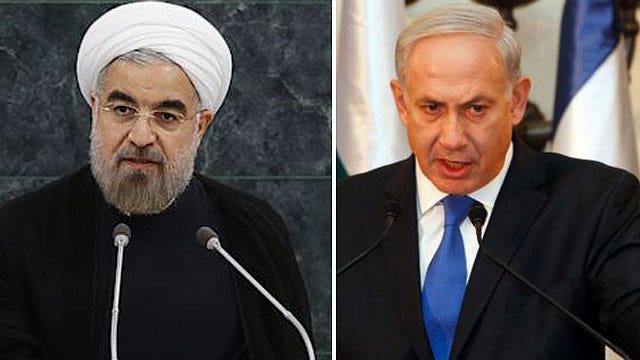Does Iran pose a greater threat to the world than ISIS?
Israeli PM Netanyahu highlights danger of nuclear ambitions at U.N.
Israeli Prime Minister Benjamin Netanyahu had high praise for President Obama for leading the coalition attacking Islamic militants in Syria, and criticized those who condemned Israel for its war with Hamas in a speech to the United Nations Monday.
Speaking at the annual U.N. General Assembly meeting in New York, Netanyahu said the threat of Hamas and ISIS reaches far beyond Israel as Islamic militants across the globe share the same goal of world domination.
“Last week, many countries here rightly applauded President Obama for leading the effort to confront ISIS. And yet weeks before, some of these same countries, that now support confronting ISIS, opposed Israel for confronting Hamas,” Netanyahu said.
“They evidently don't understand that ISIS and Hamas are branches of the same poisonous tree. ISIS and Hamas share a fanatical creed, which they both seek to impose well beyond the territory under their control,” he said.
The Israeli leader compared the spread of Islamic terrorism to a “cancer” that starts small, but left unchecked grows to cover a wider area. “To protect the peace and security of the world, we must remove this cancer before it's too late,” Netanyahu told the crowd of leaders and diplomats.
Referring to Israel’s deadly war in Gaza that ended last month, Netanyahu accused Hamas of committing "the real war crimes" by using Palestinian civilians as human shields. He showed a photograph he described as Palestinian kids playing near rocket launchers in Gaza. “Israel’s defense knocked rockets out of the sky. Israel was using its missiles to protect its children. Hamas was using its children to protect its missiles,” Netanyahu said.
Israel "was doing everything to minimize civilian casualties. Hamas was doing everything to maximize civilian casualties," he added.
It was an angry response to Palestinian leader Mahmoud Abbas' speech to the U.N. last week in which he accused Israel of conducting a "war of genocide" in Gaza. Abbas stopped short of saying he would pursue war crimes charges against Israel but said he would ask the U.N. Security Council to dictate the ground rules for any talks with Israel, including setting a deadline for an Israeli withdrawal from Palestinian lands.
With memories of the Nazi Holocaust still fresh in Israel, use of the word "genocide" is regarded as particularly provocative both to Netanyahu and Israelis in general.
And turning to another regional rival, Netanyahu said Iran's concern about the spread of terrorism is "one of history's greatest displays of double-talk." He criticized the efforts of six world powers to reach a nuclear deal with Iran, saying, "to defeat ISIS and leave Iran as a potential nuclear power is to win the battle and lose the war."
“Don't be fooled by Iran's manipulative charm offensive. It's designed for one purpose and for one purpose only: to lift the sanctions and remove the obstacles to Iran's path to the bomb.” Netanyahu insisted.
Netanyahu closed his speech with words of hope for peace with the Palestinians and suggested support from leaders of all Middle Eastern countries could help in those efforts.
“Together, we must recognize the global threat of militant Islam, the primacy of dismantling Iran's nuclear weapons capability, and the indispensable role of Arab states in advancing peace with the Palestinians,” he said.
But before Netanyahu’s speech Monday, Avigdor Lieberman, Israel's foreign minister, told reporters that it's clear that Palestinian leader Mahmoud Abbas has no intention of making peace with Israel, calling his speech to world leaders last week "a message of hatred and incitement."
Lieberman also questioned Abbas' legitimacy to speak on behalf of the Palestinian people, saying he doesn't control the Gaza Strip, where Hamas remains in charge of security and elections have been postponed for more than four years.
Lieberman said Abbas has "lost his way."
"Because he failed with all his domestic issues, he tries to resolve his domestic problems with some escalation in his rhetoric here in U.N., on the international arena," Lieberman said. "But it's clear he has no support."
Mohammed Ishtayeh, an aide to Abbas, responded to Lieberman's comments, saying: "If Lieberman and his government seek peace, why are they building settlements on our land? They left no land without settlements, no land for the Palestinians to live in."
Ishtayeh added: "Lieberman was trying to cover the war crimes his government committed in Gaza, but we have prepared the indictment list to take Israel to the ICC," using the acronym for the International Criminal Court. "We are going to build an international coalition against the Israeli occupation and its crimes, particularly building settlements on our land."
Lieberman said Israel is ready for a "comprehensive, reasonable solution" and has tried for many years to achieve a "strategic breakthrough" in its relations with the Palestinians, but "I'm sorry to say that we don't have a reliable partner from the Palestinian side, and it's a problem." He pointed to the more than 18,000 missiles and shells launched at Israel from Gaza since it withdrew from the territory.
During the 50-day Gaza war, which ended Aug. 26, Israel launched thousands of airstrikes against what it said were Hamas-linked targets in the densely populated coastal territory, while Gaza militants fired several thousand rockets at Israel. More than 2,100 Palestinians were killed, the vast majority civilians, and some 18,000 homes were destroyed, according to U.N. figures. Sixty-six soldiers and six civilians were killed on the Israeli side.
The 57-nation Organization of Islamic Cooperation, the world's largest bloc of Islamic countries, has been lobbying Abbas to seek membership in international agencies, including the ICC. That would open the door to war crimes charges against Israel for its military actions in Gaza and Jewish settlement construction on West Bank land the Palestinians want for a future state.
The Associated Press contributed to this report.








































